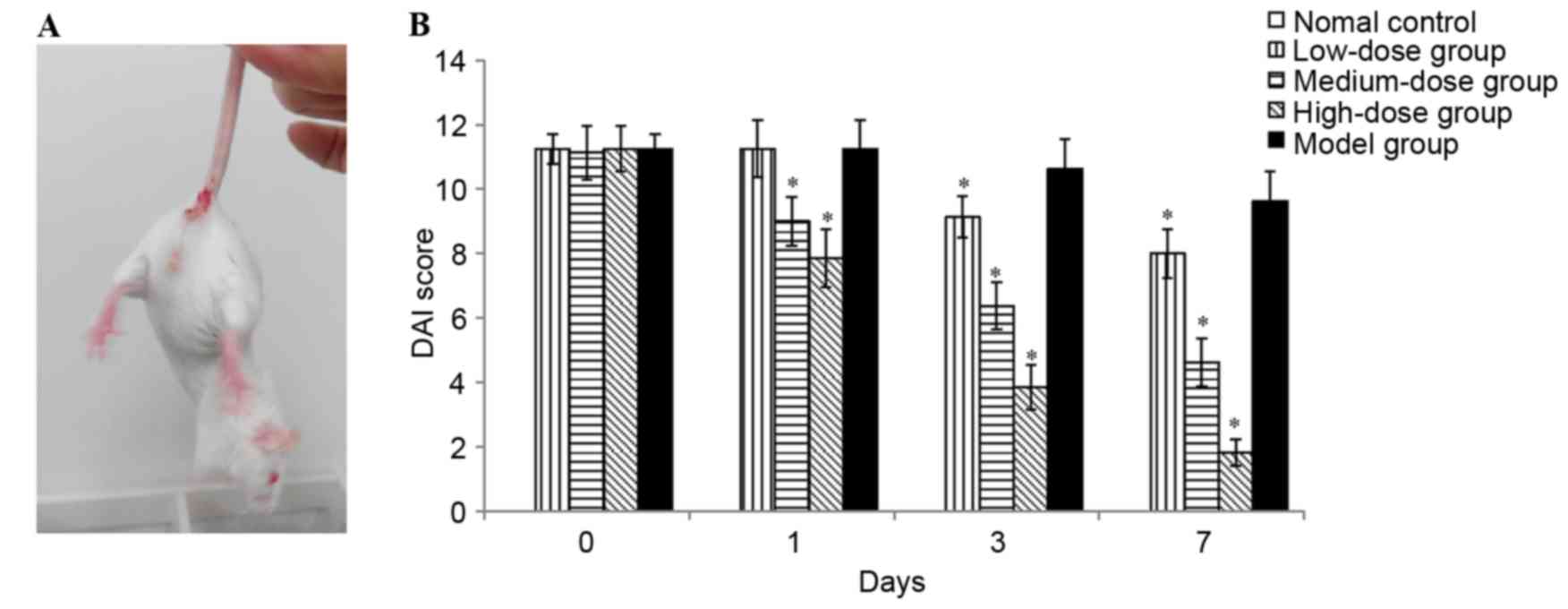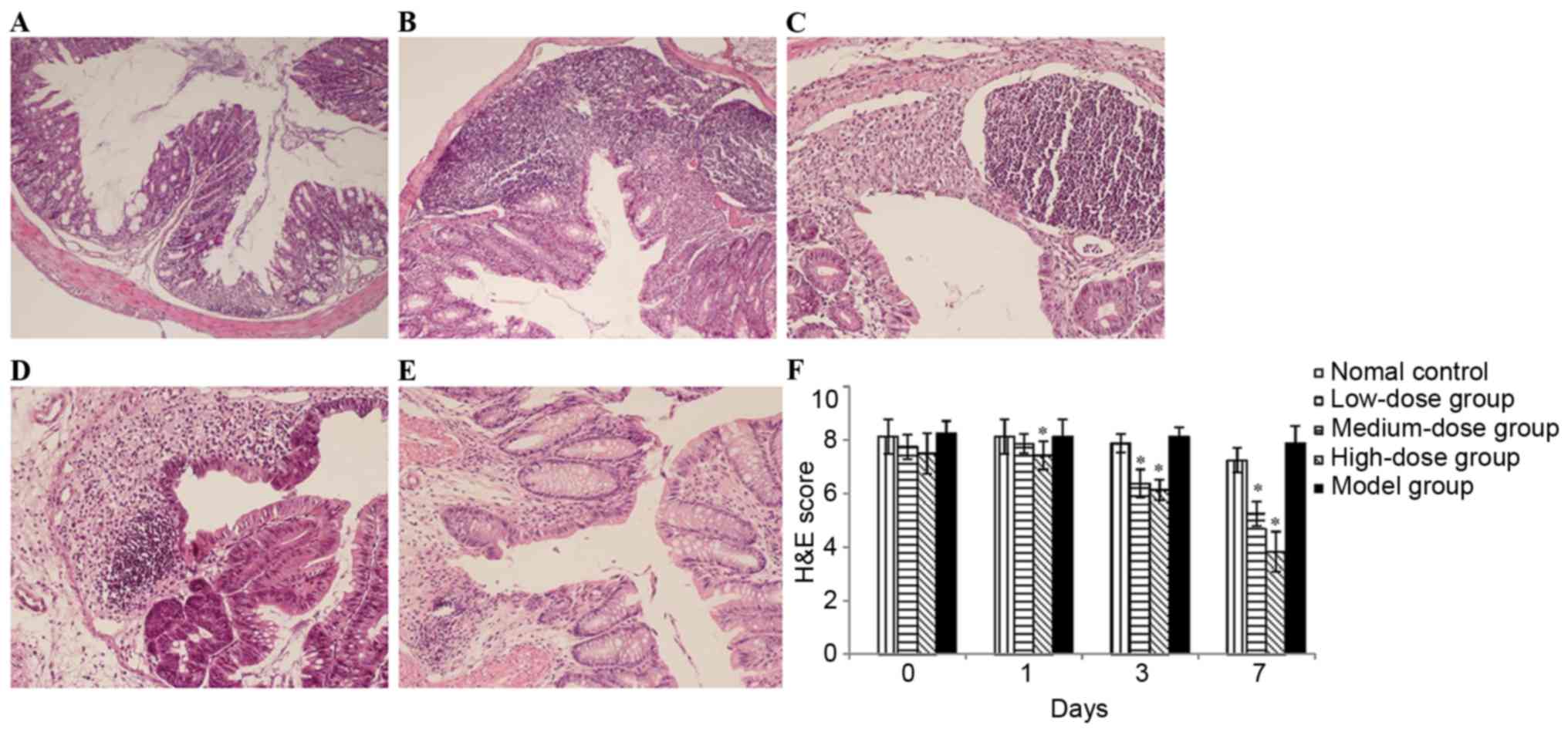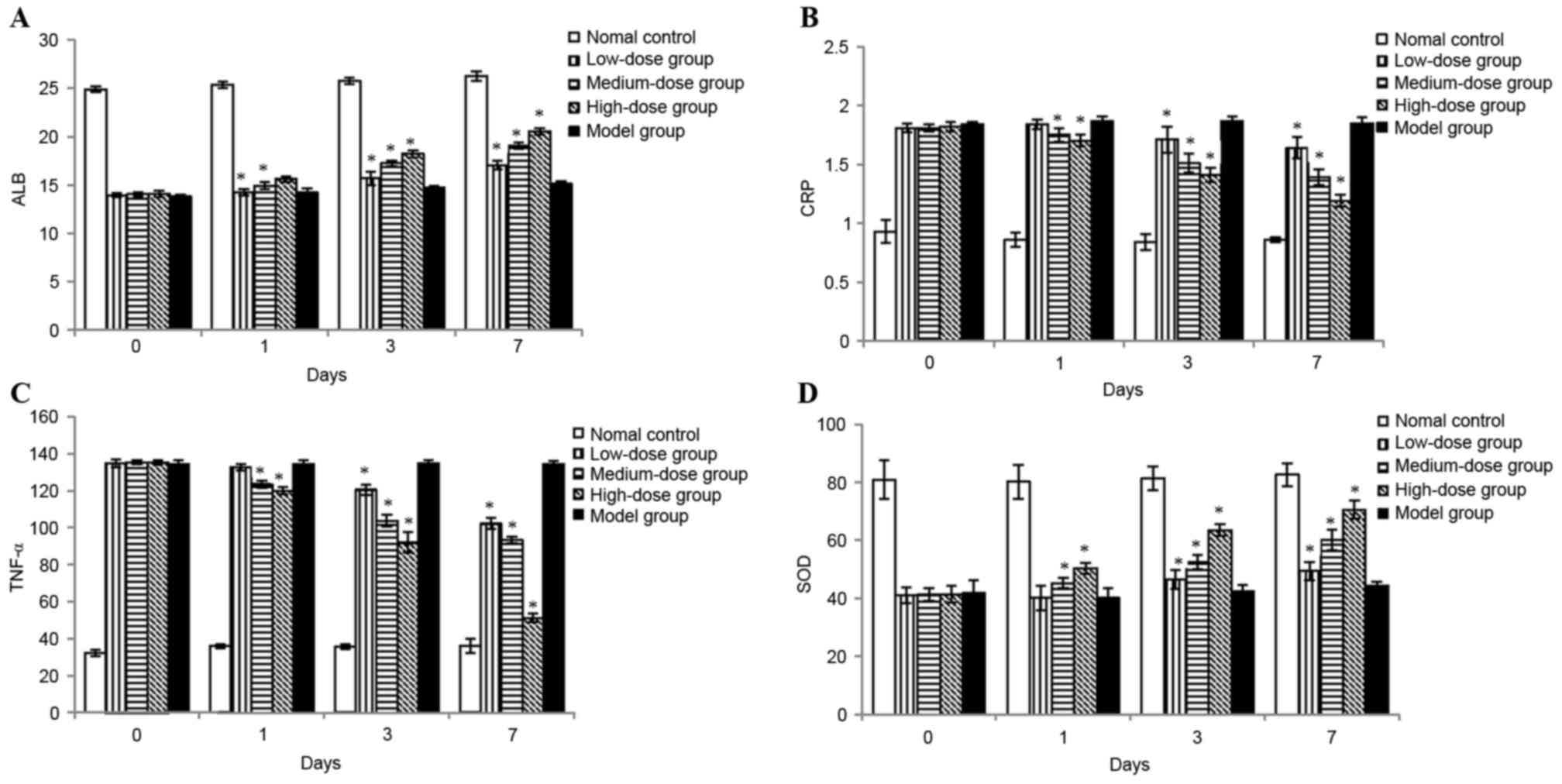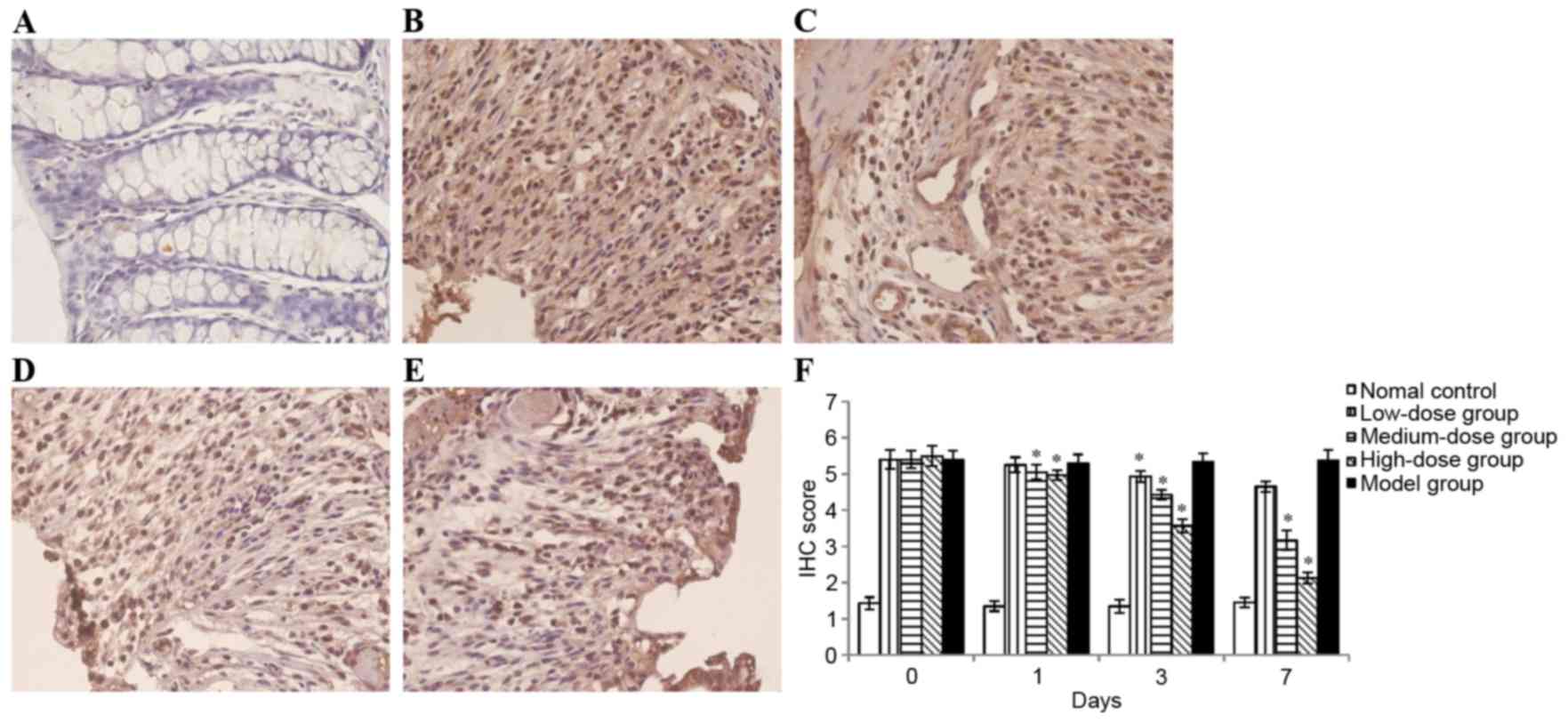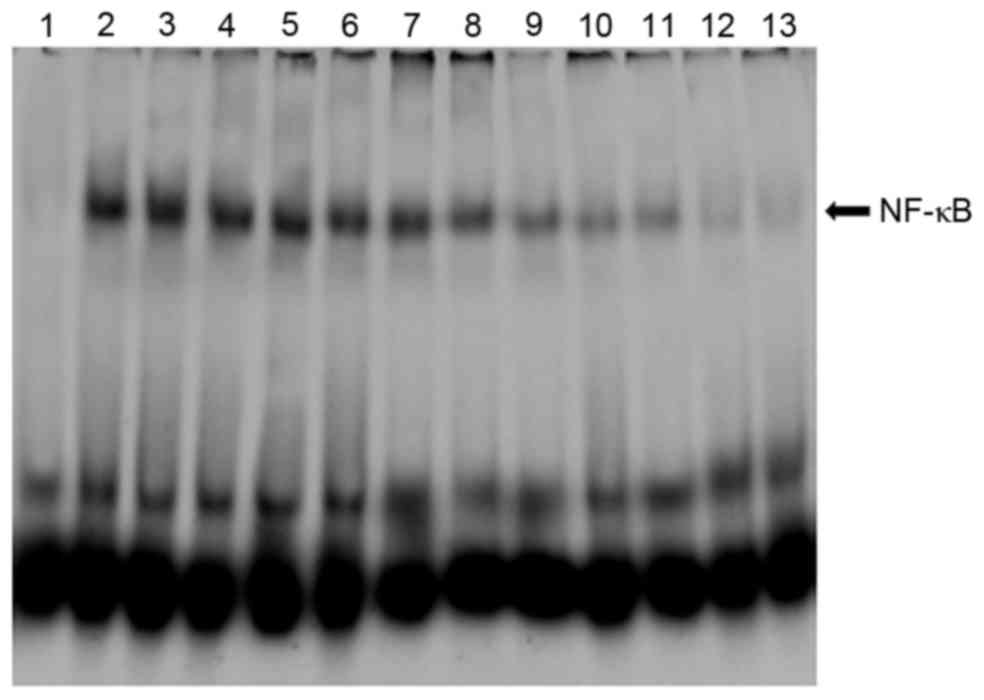|
1
|
Poxton IR, Brown R, Sawyerr A and Ferguson
A: Mucosa-associated bacterial flora of the human colon. J Med
Microbiol. 46:85–91. 1997. View Article : Google Scholar
|
|
2
|
Packey CD and Sartor RB: Interplay of
commensal and pathogenic bacteria, genetic mutations, and
immunoregulatory defects in the pathogenesis of inflammatory bowel
diseases. J Int Med. 263:597–606. 2008. View Article : Google Scholar
|
|
3
|
Eaden JA, Abrams KR and Mayberry JF: The
risk of colorectal cancer in ulcerative colitis: A meta-analysis.
Gut. 48:526–535. 2001. View Article : Google Scholar :
|
|
4
|
Lissner D and Siegmund B: Ulcerative
colitis: Current and future treatment strategies. Dig Dis.
31:91–94. 2013. View Article : Google Scholar
|
|
5
|
Alonso V, Linares V, Bellés M, Albina ML,
Sirvent JJ, Domingo JL and Sánchez DJ: Sulfasalazine induced
oxidative stress: A possible mechanism of male infertility. Reprod
Toxicol. 27:35–40. 2009. View Article : Google Scholar
|
|
6
|
Li J, Wang F, Zhang HJ, Sheng JQ, Yan WF,
Ma MX, Fan RY, Gu F, Li CF, Chen DF, et al: Corticosteroid therapy
in ulcerative colitis: Clinical response and predictors. World J
Gastroenterol. 21:3005–3015. 2015. View Article : Google Scholar :
|
|
7
|
Ferrante M, Vermeire S, Fidder H,
Schnitzler F, Noman M, Van Assche G, De Hertogh G, Hoffman I,
D'Hoore A, Van Steen K, et al: Long-term outcome after infliximab
for refractory ulcerative colitis. J Crohns Colitis. 2:219–225.
2008. View Article : Google Scholar
|
|
8
|
Khanna R and Feagan BG: Safety of
infliximab for the treatment of inflammatory bowel disease: Current
understanding of the potential for serious adverse events. Expert
Opin Drug Saf. 14:987–997. 2015. View Article : Google Scholar
|
|
9
|
Abraham C and Cho JH: Inflammatory bowel
disease. N Engl J Med. 361:2066–2078. 2009. View Article : Google Scholar :
|
|
10
|
Braus NA and Elliott DE: Advances in the
pathogenesis and treatment of IBD. Clin Immunol. 132:1–9. 2009.
View Article : Google Scholar :
|
|
11
|
Yamamoto Y and Gaynor RB: Therapeutic
potential of inhibition of the NF-kappaB pathway in the treatment
of inflammation and cancer. J Clin Invest. 107:135–142. 2001.
View Article : Google Scholar :
|
|
12
|
Setia S, Nehru B and Sanyal SN: Activation
of NF-κB: Bridging the gap between inflammation and cancer in
colitis-mediated colon carcinogenesis. Biomed Pharmacother.
68:119–128. 2014. View Article : Google Scholar
|
|
13
|
Richardson PG, Hideshima T and Anderson
KC: Bortezomib (PS-341): A novel, first-in-class proteasome
inhibitor for the treatment of multiple myeloma and other cancers.
Cancer Control. 10:361–369. 2003.
|
|
14
|
Adams J: Proteasome inhibition in cancer:
Development of PS-341. Semin Oncol. 28:613–619. 2001. View Article : Google Scholar
|
|
15
|
Murthy SN, Cooper HS, Shim H, Shah RS,
Ibrahim SA and Sedergran DJ: Treatment of dextran sulfate
sodium-induced murine colitis by intracolonic cyclosporin. Dig Dis
Sci. 38:1722–1734. 1993. View Article : Google Scholar
|
|
16
|
Fridovich I: Superoxide radical: An
endogenous toxicant. Annu Rev Pharmacol Toxicol. 23:239–257. 1983.
View Article : Google Scholar
|
|
17
|
Morris GP, Beck PL, Herridge MS, Depew WT,
Szewczuk MR and Wallace JL: Hapten-induced model of chronic
inflammation and ulceration in the rat colon. Gastroenterology.
96:795–803. 1989. View Article : Google Scholar
|
|
18
|
Dharmani P, Leung P and Chadee K: Tumor
necrosis factor-α and Muc2 mucin play major roles in disease onset
and progression in dextran sodium sulphate-induced colitis. PLoS
One. 6:e250582011. View Article : Google Scholar :
|
|
19
|
Yang J, Zhao J, Nakaguchi T and Gregersen
H: Biomechanical changes in oxazolone-induced colitis in BALB/C
mice. J Biomech. 42:811–817. 2009. View Article : Google Scholar
|
|
20
|
Hagar HH, El-Medany A, El-Eter E and Arafa
M: Ameliorative effect of pyrrolidinedithiocarbamate on acetic
acid-induced colitis in rats. Eur J Pharmacol. 554:69–77. 2007.
View Article : Google Scholar
|
|
21
|
Narushima S, Spitz DR, Oberley LW,
Toyokuni S, Miyata T, Gunnett CA, Buettner GR, Zhang J, Ismail H,
Lynch RG and Berg DJ: Evidence for oxidative stress in
NSAID-induced colitis in IL10-/- mice. Free Radic Biol Med.
34:1153–1166. 2003. View Article : Google Scholar
|
|
22
|
Seril DN, Liao J, Yang GY and Yang CS:
Oxidative stress and ulcerative colitis-associated carcinogenesis:
Studies in humans and animal models. Carcinogenesis. 24:353–362.
2003. View Article : Google Scholar
|
|
23
|
Perše M and Cerar A: Dextran sodium
sulphate colitis mouse model: Traps and tricks. J Biomed
Biotechnol. 2012:7186172012. View Article : Google Scholar :
|
|
24
|
Sandborn WJ and Targan SR: Biologic
therapy of inflammatory bowel disease. Gastroenterology.
122:1592–1608. 2002. View Article : Google Scholar
|
|
25
|
Vermeire S, Assche G and Rutgeerts P:
C-reactive protein as a marker for inflammatory bowel disease.
Inflamm Bowel Dis. 10:661–665. 2004. View Article : Google Scholar
|
|
26
|
Gabay C and Kushner I: Acute-phase
proteins and other systemic responses to inflammation. N Engl J
Med. 340:448–454. 1999. View Article : Google Scholar
|
|
27
|
Piechota-Polanczyk A and Fichna J: Review
article: The role of oxidative stress in pathogenesis and treatment
of inflammatory bowel diseases. Naunyn Schmiedebergs Arch
Pharmacol. 387:605–620. 2014. View Article : Google Scholar :
|
|
28
|
Neurath MF, Pettersson S, zum Buschenfelde
KH Meyer and Strober W: Local administration of antisense
phosphorothioate oligonucleotides to the p65 subunit of NF-kappa B
abrogates established experimental colitis in mice. Nat Med.
2:998–1004. 1996. View Article : Google Scholar
|
|
29
|
Rogler G, Brand K, Vogl D, Page S,
Hofmeister R, Andus T, Knuechel R, Baeuerle PA, Schölmerich J and
Gross V: Nuclear factor kappaB is activated in macrophages and
epithelial cells of inflamed intestinal mucosa. Gastroenterology.
115:357–369. 1998. View Article : Google Scholar
|















